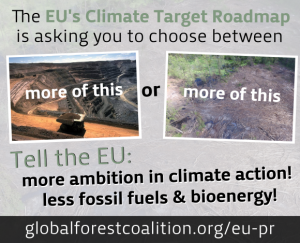 Amsterdam, 23rd June 2020 – Global Forest Coalition is a coalition of 100 NGOs and Indigenous Peoples Organisations who work to protect and defend forests, social justice and the rights of forest peoples. We write to express our deep concerns about the impacts of the EU’s promotion of bioenergy, especially through the Renewable Energy Directive (RED), on forests and wildlife, on the climate, and on communities.
Amsterdam, 23rd June 2020 – Global Forest Coalition is a coalition of 100 NGOs and Indigenous Peoples Organisations who work to protect and defend forests, social justice and the rights of forest peoples. We write to express our deep concerns about the impacts of the EU’s promotion of bioenergy, especially through the Renewable Energy Directive (RED), on forests and wildlife, on the climate, and on communities.
Together with many other groups and individuals, we submitted evidence and set out our concerns in a submission to the Climate Target Plan inception impact assessment consultation earlier this year.[i] We are deeply disappointed that the European Commission has not responded to any of this evidence and that the wording of the current consultation does not reflect any recognition of these concerns.
Organisations and individuals responding to the current consultation are asked whether they would like the EU’s renewable energy target to be raised from 32% to 40%, in order to contribute to 40% greenhouse gas savings by 2030. In early 2019, Greta Thunberg rightly denounced this 40% target as a “surrender” to escalating climate change and as putting the goal of limiting global warming to 2 degrees – let alone 1.5 degrees – out of reach.[ii] We fully agree with this. 60% reliance on fossil fuels a decade from now is incompatible with the Paris Agreement and with the need to address the climate emergency.
At the same time, respondents are asked to comment on different unambitious renewable energy targets without letting them comment on the different technologies promoted by those targets.
Around 60% of the EU’s renewable energy target is met through bioenergy, especially biofuels and bioliquids (including from palm oil) and wood-based biomass (which accounts for the largest share of bioenergy). Under the conditions of the RED (and from 2021, RED 2), a higher renewable energy target automatically raises the share of bioenergy.
In relation to transport biofuels and bioliquids, the Commission is well aware of the evidence regarding the high greenhouse gas emissions, especially those from indirect land use change, associated with fuels made from dedicated crops, as well as the disastrous impacts which direct and indirect land use change have as drivers of deforestation, land-grabbing and food price volatility. Yet the only relevant question asked is whether respondents agree that “Agriculture/aquaculture as a source of biomass for bioenergy and biofuels” might “play the most important role to reduce greenhouse gas emissions and increase CO2 removals in the land use sectors” (Section 2.9).
In relation to solid biomass, one of the questions gives respondents the option of supporting “additional measures to ensure that biomass use remains sustainable” (Section 5.6.1). This implies that current biomass use is sustainable – a claim we strongly disagree with.
Furthermore, no questions are asked as to whether the overall amount of biomass burned should be reduced, let alone whether including wood-based bioenergy should continue to be supported by the RED 2 at all.
In 2018, 800 scientists warned the EU that “allowing the harvest and burning of wood under the directive will transform large reductions otherwise achieved through solar and wind into large increases in carbon in the atmosphere by 2050”.[iii] Similar warnings have been issued by the European Academies’ Science Advisory Council.[iv] Furthermore, a peer-reviewed study has shown that even the use of genuine forestry residues for energy is incompatible with the need to limit global warming to 1.5 degrees.[v] Further incentivising the burning of wood for energy may allow EU greenhouse gas reduction targets to be met on paper, but will not reduce the amount of CO2 emitted to the atmosphere and not help to address the climate emergency. In its “Summary for Policymakers”, the IPCC Special Report on the impacts of global warming of 1.5°C concludes that “bioenergy crops, reforestation or afforestation encroach on land needed for agricultural adaptation, can undermine food security, livelihoods, ecosystem functions and services and other aspects of sustainable development”.[vi]
At the same time, the promotion of wood burning for energy through RED and now RED 2 is contributing to more habitat loss, thus accelerating the loss of biodiversity worldwide. Furthermore, it is incompatible with the EU’s commitments to reducing air pollution, especially fine particulate pollutants (PM2.5).
We believe that civil society groups and individuals should not be asked to choose between high levels of fossil fuel use on the one hand and high levels of bioenergy, including biofuels and bioliquids from energy crops and wood-based biomass on the other hand.
We urge the EU to immediately modify the consultation procedure and the questionnaire. A meaningful consultation process needs to start by acknowledging the civil society concerns and dilemmas and seek evidence and views about how to address them.
[i] ec.europa.eu/info/law/better-regulation/have-your-say/initiatives/12265-2030-Climate-Target-Plan
[ii] marketwatch.com/story/eu-unveils-new-climate-law-greta-thunberg-calls-it-surrender-2020-03-04
[iii] pfpi.net/wp-content/uploads/2018/04/UPDATE-800-signatures_Scientist-Letter-on-EU-Forest-Biomass.pdf
[iv] See for example
[v] iopscience.iop.org/article/10.1088/1748-9326/aaac88
[vi] IPCC, 2018: Summary for Policymakers. In: Global Warming of 1.5°C. An IPCC Special Report on the impacts of global warming of 1.5°C above pre-industrial levels and related global greenhouse gas emission pathways, in the context of strengthening the global response to the threat of climate change, sustainable development, and efforts to eradicate poverty, pg19
